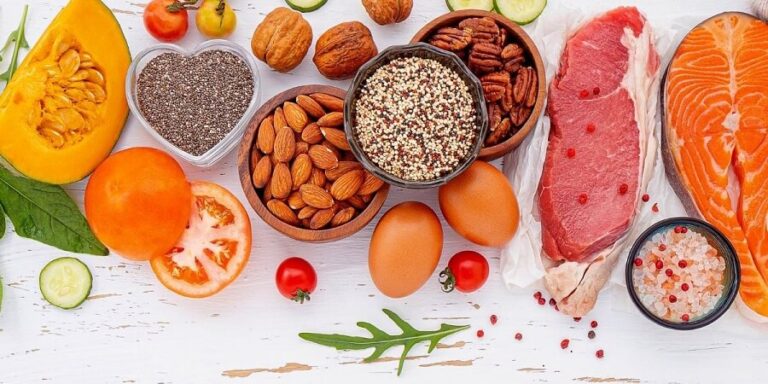One of the most common questions when dieting is why body weight increases even with strict adherence to the calorie intake you need per day. In many cases, people even gain weight and gain the same weight, despite consuming the recommended caloric intake.
The answer is not unique. For example, there may be an error in the calculation, the daily calorie intake of 2000 kcal for women and 2500 kcal for men is an average figure and not adapted to each person. As well as, they may be due to adaptations of the body to restrictive diets, or not taking into account that caloric requirements decrease with age, among others.
Read on to find out why you can’t lose weight even when you eat low calories.
I eat little and I can’t lose weight …
Obesity is the most common metabolic disorder in the world. The World Health Organization estimates that one in three adults on the planet is overweight and one in ten is obese. (2)
At the same time, weight gain is a process that amplifies over time. The more fat is stored in the body, the more difficult it is for the body to maintain normal levels of hormones related to appetite: leptin and ghrelin; which leads to an increase in appetite and as a result, the consumption of additional calories.
Studies show that 300 kcal per day is the amount you need to lose weight. (1) In other words, if a person consumes 300 fewer calories than the norm requires, he will lose weight; however, the problem is that special tools are needed to determine the exact caloric norm for each one.
RELATED:
First of all, let’s remember long-term planning: in a couple of days (or even a week), no conclusions can be drawn about the effectiveness of any diet or training regimen. To lose weight and fix the result, you will need at least 2-3 months of nutritional control.
Now let’s look at the main reasons why you gain weight when you eat the calories you think you need:
1. The number of calories is incorrectly determined
The calorie intake you need cannot be determined with a simple household scale, an app, or an online calculator. Any of the most accurate methods, such as the basal metabolic rate , involves the use of a daily activity coefficient ranging from 1.2 to 1.8, even these methods have up to an error of 100 to 700 kcal.
2. You burn fewer calories than you think
The number of calories burned that you see on the screen of, for example, an elliptical trainer are not exact calories. We are talking about the averaged data recorded in the memory of the device. Actually, when training on a stationary bike, a person expends 250 to 800 kcal, depending on body weight and pedaling speed.
3. Dietism
There is sufficient evidence to affirm that dieting (extremely restrictive diets with pleasure deprivation) is the
best predictor of weight gain. This means that people who go on extreme diets gain more weight compared to people who never dieted.
As there is an extreme lack of calories from food, the body activates a compensatory mechanism to avoid wasting energy (metabolic expenditure drops by up to 40%). This leads us to a result opposite to the one sought: the famous rebound effect.
4. Endocrine Disruptors
Endocrine disruptors are man-made chemicals that can
alter cellular signals involved in body weight, lipid homeostasis, and even fat distribution. The most common are pesticides and some plastics. Numerous studies have associated exposure to endocrine disruptors with obesity, classifying them as obesogens. (3)
5. The germs in your gut are different
The population of microbes that inhabit the intestines is different in obese individuals than in lean individuals. This means that the way the body processes calories can vary dramatically from one person to another.
Antibiotic treatments at an early age can alter the composition of the intestinal microbiota, which can lead to a reduction in protective species against obesity. Consuming probiotics can help in these cases.
6. Genetic susceptibility
Genetics may be a contributing factor as to why you eat the right amount of calories, but gain weight. However, in 95% of cases it is not correct to attribute weight to this cause. Scientific evidence has shown that to gain weight an “obesogenic” environment is necessary, full of food stimuli, sedentary work or excessive workload without the possibility of training, stress among others.
7. Eat on the go
Another factor that affects weight loss is the composition of the macro diet . What does this mean? If you find yourself eating an adequate amount of calories but struggling to lose weight, you may not be consuming the ideal ratio of carbohydrates, protein, and fat .
If you are in a hurry and lack of time for a full meal, the choice of dishes does not usually fall on natural foods that are useful in nutrients and help you lose weight, but on fast food. Although they may have the same calories, a diet rich in junk foods will generate negative changes in your body.
8. Food becomes a reward
If you count calories throughout the day to get to the couch at night and sit down to watch a TV show in the company of sweets, this is a food reward manifestation. While food can be a source of pleasure, taking it as an emotional reward is not a good idea; as this can easily lead to weight gain.
RELATED:
- How to lose weight after menopause?
- How to learn to eat less to lose weight?
- How to reduce abdominal fat?
Hormones of hunger and satiety
The Leptin is a key hormone that regulates satiety. It is produced in visceral fat and controls the metabolism of calories in the body, including the development of obesity. In women, leptin can increase after menopause, which is one of the reasons for weight gain.
The ghrelin is a hormone of the human appetite controlling the amount of food eaten, regulates intestinal motility and affects insulin synthesis and hormone growth . It is produced in the stomach in the absence of food and is a direct signal to neurons in the brain for actions related to the search for food.
By balancing the production of ghrelin, leptin, and insulin, the body can maintain a normal body weight. If their metabolism is disturbed, a person may feel the need for different calories, regardless of the actual needs of the body, which can lead to overeating.
To lose weight and control these hormones, it is recommended to eat more protein foods, slightly reducing the amount of carbohydrates and controlling the consumption of healthy fats (in particular, avoiding trans fats).
ABSTRACT
If you cannot lose weight even if you maintain your calorie intake, you must first make sure that you have calculated this figure correctly. Then, you must evaluate if you are choosing foods correctly (if possible organic) and avoid extreme diets, reducing 300 Kcal per day is enough.







